The 7 Phases of Adrenal Fatigue
The adrenal glands help the body adapt to stress and reproduce through the unique compounds they produce and secrete. Over 50 essential hormones are produced within the adrenal glands. These hormones are critical to health and vitality. When we are overstressed, the adrenals pump out stress hormones until they fatigue and crash, which can be devastating to the body.
This can lead to a number of different symptoms, with the most common being fatigue and inconsistent energy. Adrenal fatigue can be the primary trigger behind a health condition, or it can be secondary to chronic infections, upper cervical stress, blood sugar dysregulation, etc. Here is the list of major symptoms associated with adrenal fatigue.
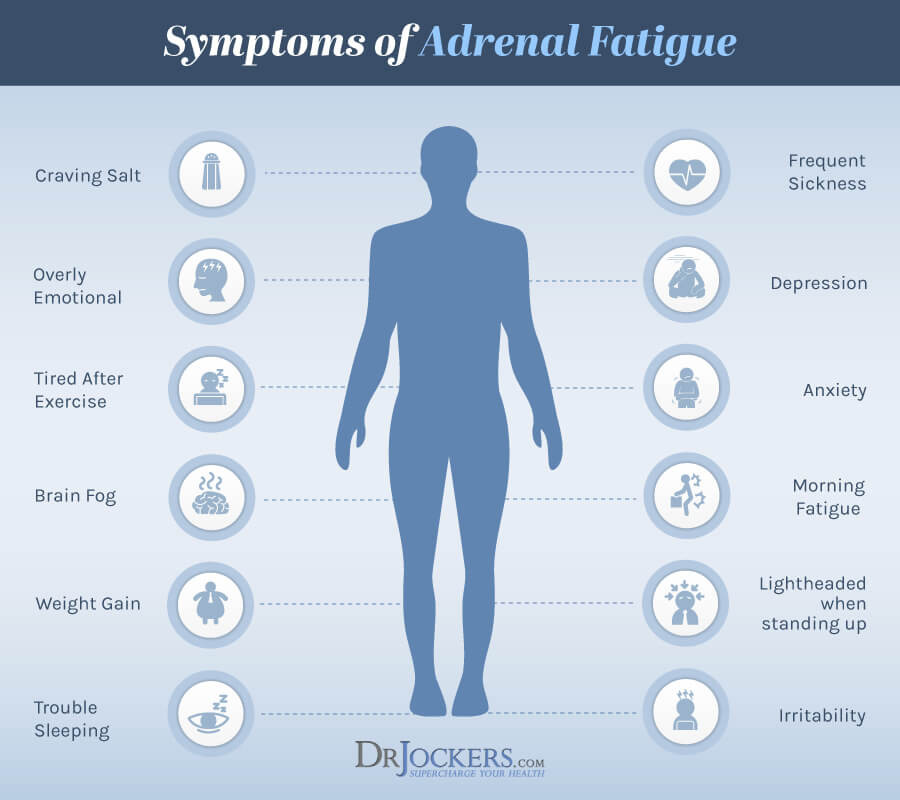
The Major Function of the Adrenals:
Some other major issues people will often experience include feeling really tired around 2-4 PM, but getting another kick of energy in the evening, and then having no sleep or poor quality sleep at night. These are often early signs that you are moving towards adrenal fatigue and the body is rewiring its physiological processes.
Although the adrenals are no bigger than the size of a walnut, they have an incredibly important role in the human life cycle. Some of the many different hormones created by the adrenals include steroid hormones such as adrenaline, norepinephrine, cortisol, aldosterone, estrogen, and testosterone (1).
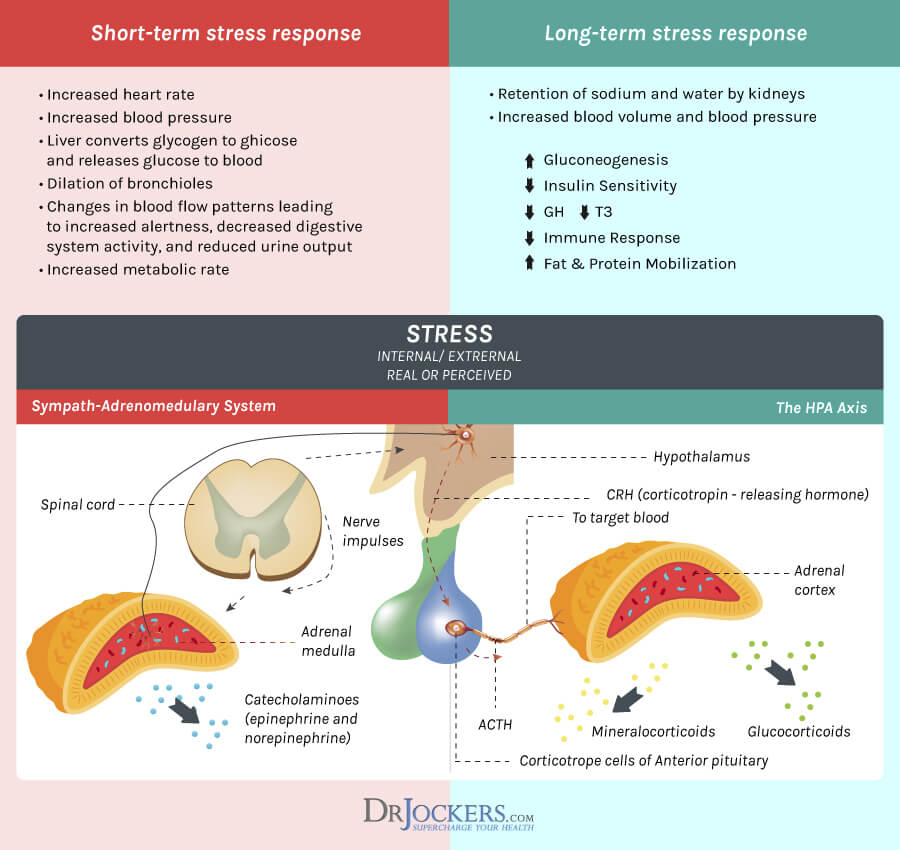
4 Categories of Hormones and Adrenal Fatigue:
There are 2 major regions within the adrenal glands that produce hormones. This is the adrenal cortex and the adrenal medulla. The adrenal cortex is in the outer circumference of the adrenal glands. It produces three classes of hormones:
1. Mineralocorticoids:
This is primarily aldosterone, which acts to maintain the proper salt and water levels to ensure the right blood pressure. Without aldosterone, the kidneys will excrete most of the sodium and water, leading to severe dehydration, low blood pressure, and possible death.
Individuals who struggle with high blood pressure often take medications that reduce the amount of circulating aldosterone to reduce sodium and water content in the blood. This results in a lowering of the blood pressure (2).
Individuals who struggle with too low blood pressure often have either an inability to produce and utilize aldosterone. This could be a genetic issue or a functional problem related to adrenal gland exhaustion.
2. Glucocorticoids:
This mainly refers to cortisol, which is involved in the stress response, and its main function is to increase blood sugar and reduce inflammation. Cortisol stimulates glucose production within the liver and muscle cells, increasing blood sugar levels in order to prepare for a fight or flight response. In addition, it has significant anti-inflammatory effects.
High cortisol will cause increased blood sugar levels and can lead to weight gain (3). When the body is under chronic stress, we are unable to produce enough cortisol to keep up with the demands, and therefore, we are unable to manage blood sugar and inflammation. The key is to have good cortisol balance in order to maintain proper blood sugar and inflammation levels.
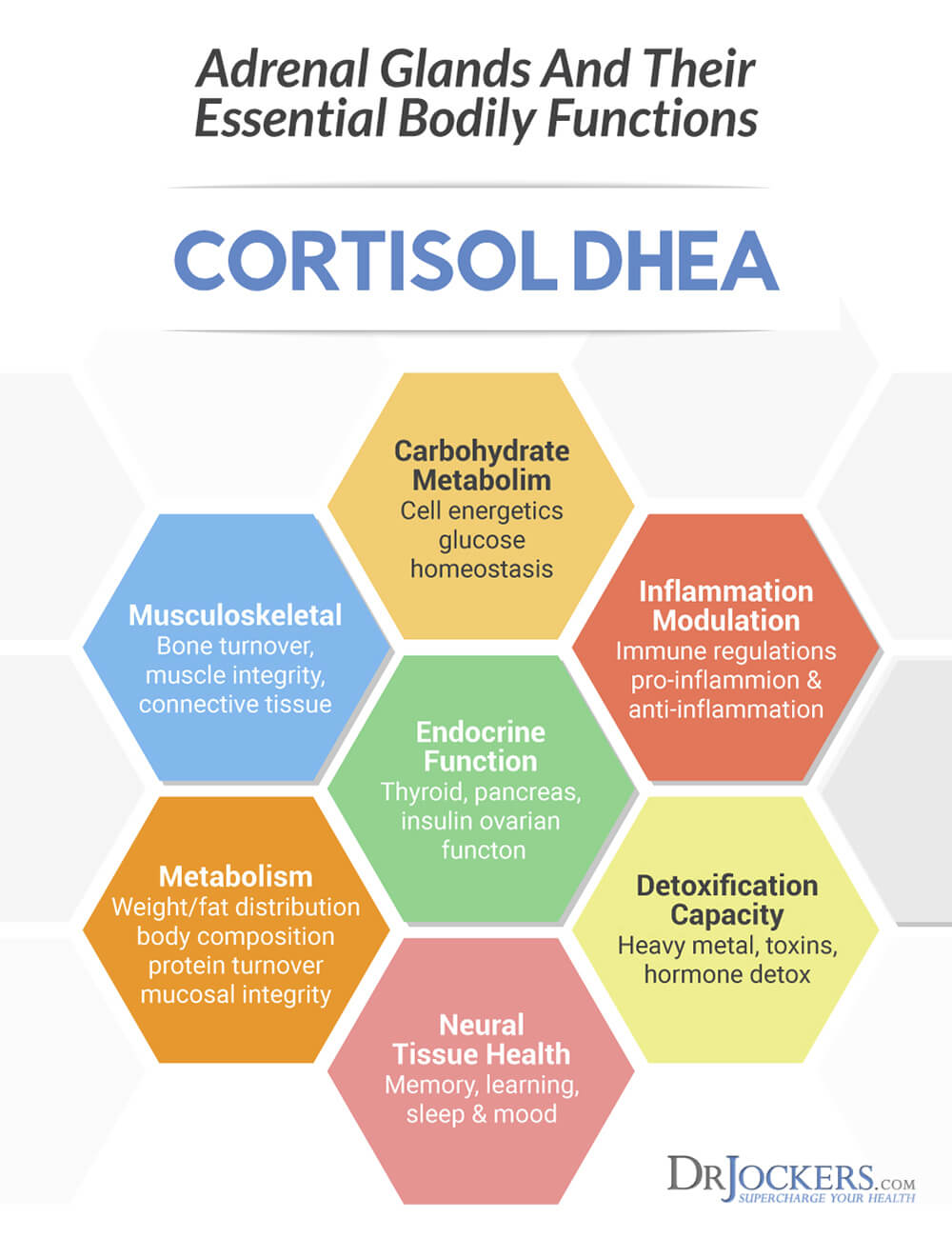
3. Sex Hormones:
This includes the master precursor hormones DHEA and pregnenolone as well as estrogen, progesterone, and testosterone. All have weak effects, but play a role in the early development of the male sex organs in childhood, and in women during puberty. These are involved in creating and maintaining the differences between men and women.
The adrenal medulla is in the deep, inner region of the adrenal glands, and it produces catecholamines. The medulla has a direct connection to the brain, which is unique for an endocrine organ. When the body is under stress, it fires directly to the medulla to raise catecholamines. This allows the body to react very quickly to stress.
4. Catecholamines:
This includes adrenaline, noradrenaline, and small amounts of dopamine. These hormones are the major players in the physiological characteristics of the stress response, the so called ‘fight or flight’ response. They act to drive up blood pressure, increase heart rate and respiration, and increase mental awareness.
The fight or flight response is super critical for survival and for things like exercise and athletic performance. We also use this response in a positive manner when we do things like a business presentation. However, when this stress response is chronic, it wears down the body’s vital reserves and hampers the body’s ability to heal itself (4).
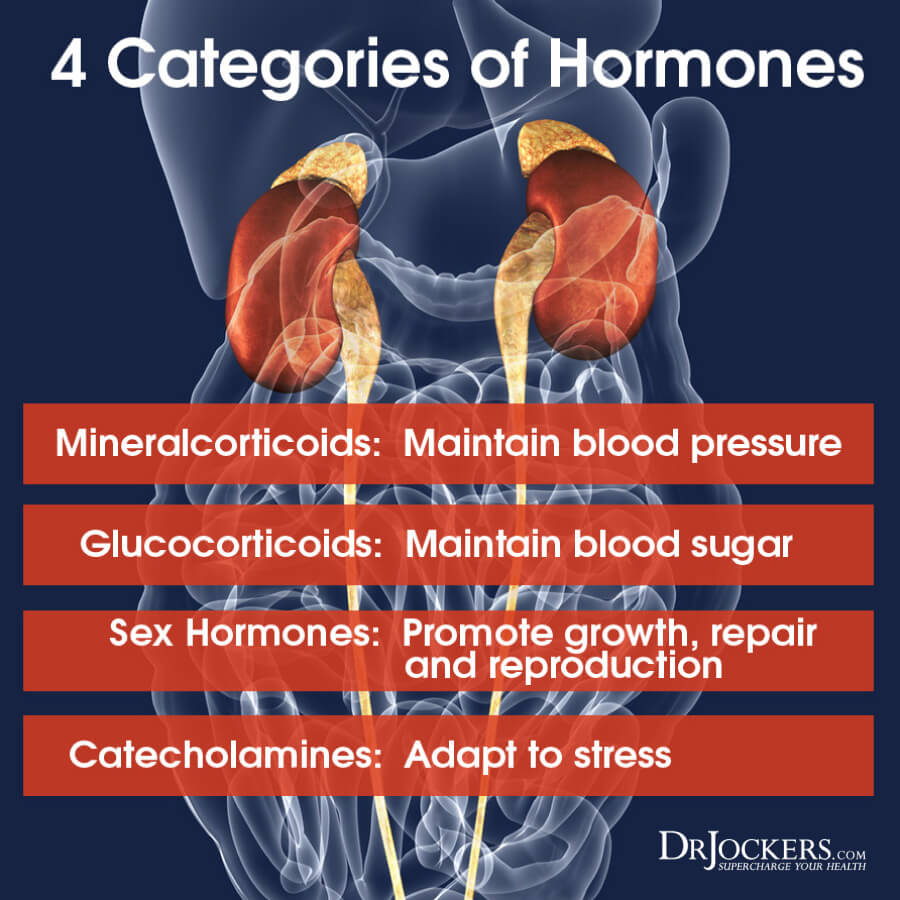
The Major Adrenal Hormones:
Here is a review of what these key hormones do for the body:
Epinephrine: Also called adrenaline, made in the adrenal medulla, this helps to dilate blood vessels, increase heart rate, blood sugar, and blood pressure so we can move and react quickly. This is necessary for emergencies and times when we are exercising or performing (such as giving a speech or performing in an athletic event.
Norepinephrine: This is a chemical made in the adrenal medulla that activates our sympathetic nervous system to help our body adapt to stress through fight or flight. It has very similar activity to epinephrine but is classified as a neurotransmitter in that it interacts with the brain and nervous system more than epinephrine, which is classified as a stress hormone.
Cortisol: This is made in the adrenal cortex and is called a “glucocorticoid” because of the cortex and how it functions to increase circulating glucose levels. Cortisol helps maintain blood sugar levels during times of stress. It also acts to reduce inflammation in the body.
Aldosterone: This is called a “mineralocorticoid” hormone because of its production in the adrenal cortex and its role in maintaining electrolyte balance to raise blood pressure. When secreted, it acts on the kidney to reabsorb sodium, excrete potassium, and increase fluid volume. Drugs are often used to lower aldosterone levels in individuals with hypertension.
Estrogen: This is the primary female sex hormone, although males produce it as well. The three major naturally occurring forms of estrogen in women are estrone (E1), estradiol (E2), and estriol (E3). Another type of estrogen called estetrol (E4) is produced only during pregnancy.
Progesterone: This is one of the key female sex hormones that plays a role in maintaining pregnancy and fertility. Progesterone is produced primarily in the ovaries and the adrenal glands. Its main responsibility is to prepare the body for conception and pregnancy, sexual desire, and the regulation of the menstrual cycle.
Testosterone: This is a key sex hormone that is created in the testicles of males, the ovaries of females, and the adrenal glands. It plays a key role in growth, mental drive, muscle development, and fat metabolism, as well as sexual desire.
Pregnenolone: This is the major precursor to all the major adrenal hormones, as well as neuroactive steroids that help to improve brain function. Pregnenolone is produced from cholesterol, and depending upon the environmental needs, it will form into various amounts of progesterone, cortisol, aldosterone, and DHEA.
DHEA: This is shortened for didehydroepiandrosterone, which is the most abundant circulating steroid hormone in humans. It is produced in the adrenal cortex, the gonads, and the brain. DHEA functions predominantly as the metabolic intermediate in the formation of estrogen and testosterone.
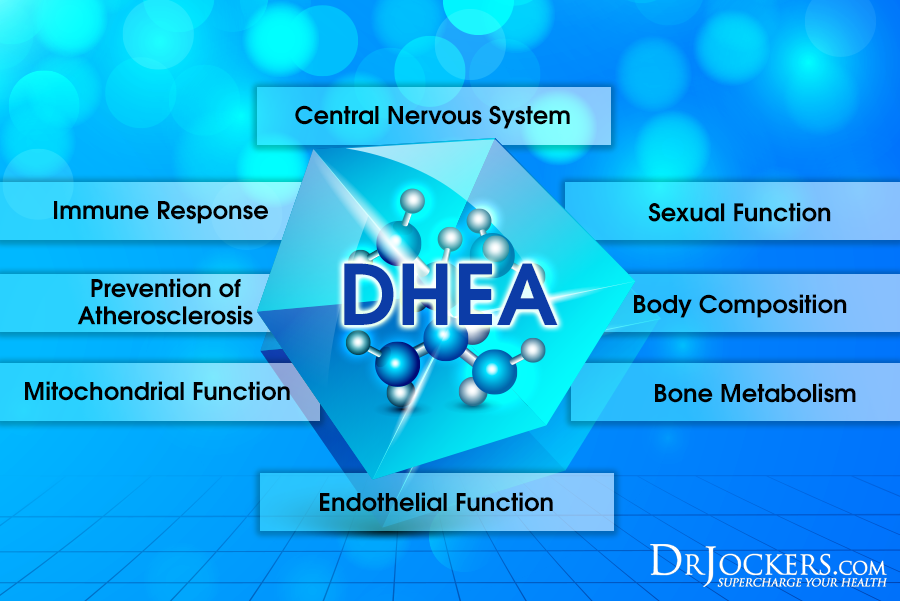
Stress Hormones Before Sex Hormones:
The adrenal glands help to regulate the body’s ability to adapt to stress, and they also produce hormones that regulate reproduction. The caveat is that adapting to stress overrides reproduction. Adapting to stress is critical for immediate survival, and that is first priority. Once our physiology understands that we are not under an environmental threat, then it will focus its energy on reproductive hormones.
The major stress hormones are cortisol, epinephrine, and norepinephrine. These hormones help increase energy, increase blood sugar levels, and speed up circulation and respiration to help the body survive through fight or flight.
The major sex hormones produced by the adrenals are estrogen, progesterone, and testosterone. These are all critical for growth, metabolism, strength, endurance, mental drive, menstrual function, and reproductive ability.
The master compound that is used by the body to produce cortisol and progesterone is called pregnenolone. Pregnenalone can either create cortisol, progesterone, or DHEA. DHEA is used by the body to produce testosterone and estrogen. When the body is under chronic stress, there is a high demand to produce cortisol, which reduces the amount of progesterone and DHEA that is produced (5).
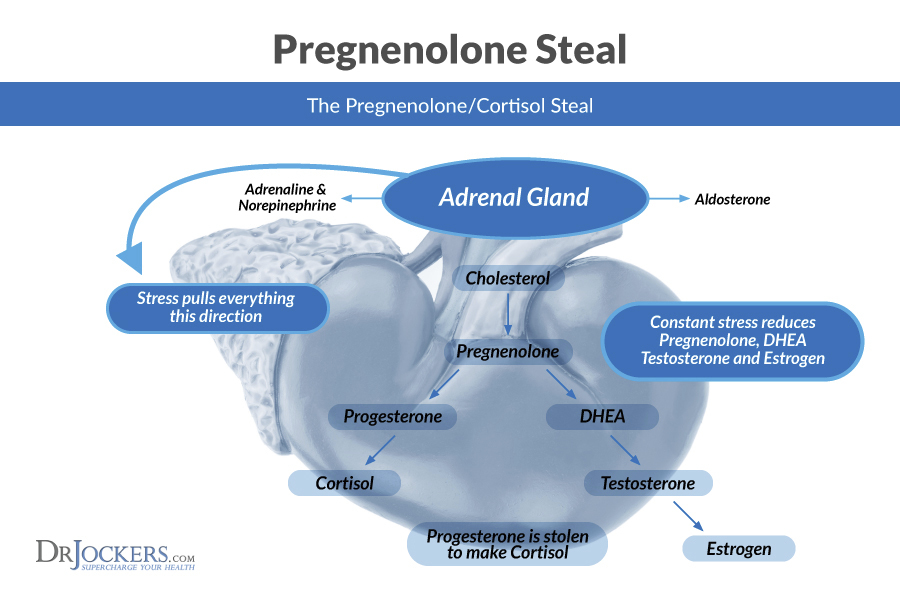
What Stresses the Adrenal Glands?
The adrenal glands are meant to adapt the body to stressors. Our body was designed to grow stronger through daily stressors. We should have a natural stress, rest, and adaptation cycle that allows the body to effectively acclimate to the environmental stimuli. However, when these stressors override our ability to adapt effectively, the body becomes weaker and chronic stress becomes hardwired into our system. This can lead to adrenal fatigue.
The adrenal glands are overstressed by a number of different chronic lifestyle factors including the following:
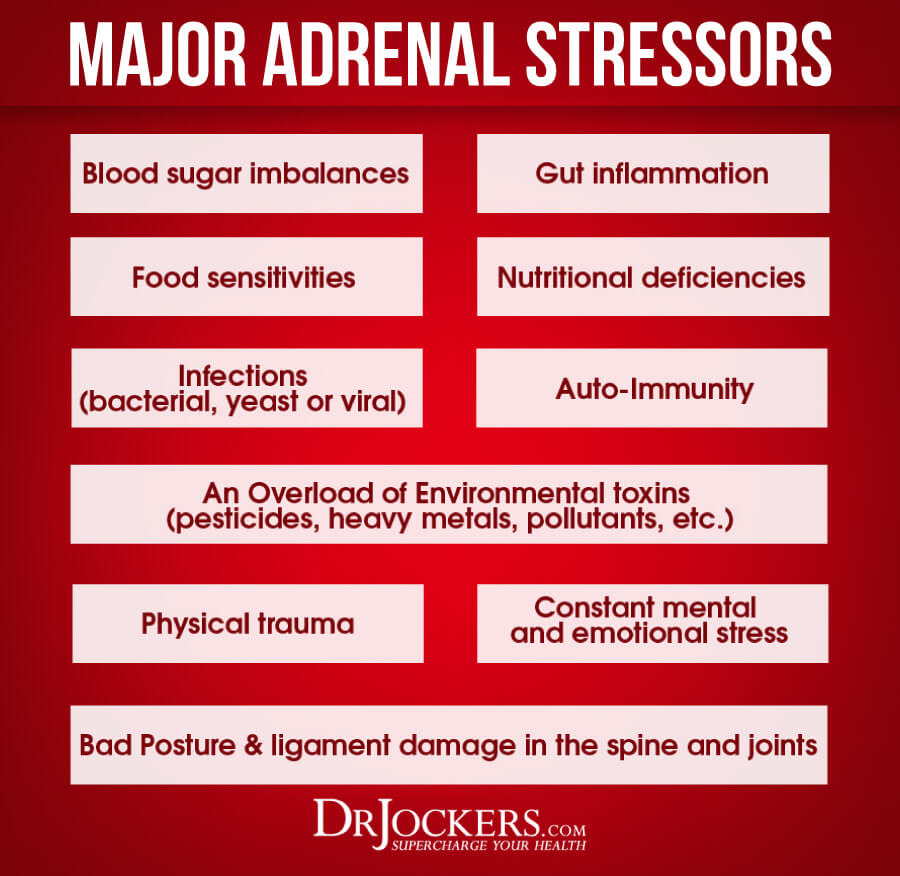
The HPA Axis and the Stress Response:
The body perceives and adapts to stressors through what is called the hypothalamic-pituitary-adrenal (HPA) axis. This area of the brain, called the hypothalamus, senses the environmental conditions and then it sends signals in the form of chemicals to the pituitary gland.
The pituitary gland receives the signals from the hypothalamus (corticotropin releasing hormone – CRH) and sends its own chemical signals to the adrenal cortex through a hormone called adrenocorticotropic hormone (ACTH) in order to form the appropriate responses to the environmental stimuli.
When we are under chronic stress, it creates an alteration in the HPA axis, which reduces the body’s ability to adapt to new stressors. This condition is called adrenal fatigue, which can also progress further to adrenal exhaustion. This process of stress and poor adaptation can lead to a vicious cycle of chronic inflammation, tissue breakdown, and accelerated aging (6).
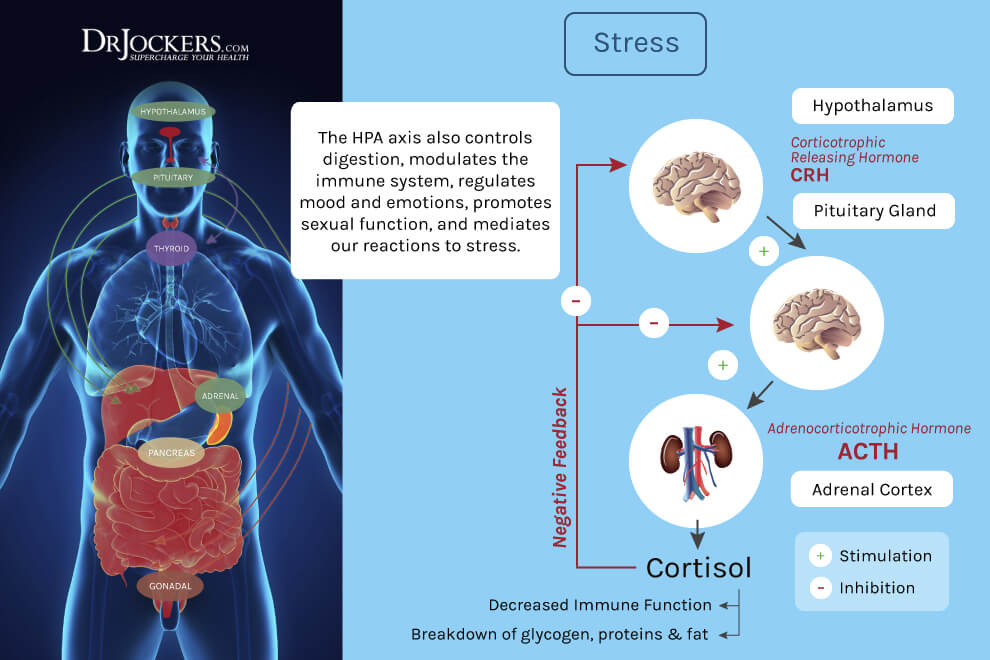
The Phases of Adrenal Fatigue:
The first stage of adrenal activity is called the alarm reaction, where the system becomes hyperactive to increase cortisol levels to adapt to the demands of stress. This is a healthy survival based response that everyone encounters throughout a typical day.
The second phase is the resistance stage, where the body adapts to prolonged stress. During this phase, the body steals pregnenolone from cholesterol to make more cortisol. This phenomenon is called pregnenolone steal.
Under normal circumstances, the pregnenolone helps make sex hormones such as progesterone and testosterone. When pregnenolone steal takes place, it leads to hormonal imbalances. Over time, this can cause very serious hormonal problems such as PMS, infertility, male menopause, and polycystic ovary syndrome (PCOS).
The third and final phase of adrenal fatigue is the exhaustion phase. This is when the adrenals are so exhausted that they are unable to adapt to stress. All the necessary cofactors to produce cortisol are depleted, and so cortisol levels drop. The progenenolone steal effect stops at this point, but the body is unable to produce adequate energy, and fatigue, accelerated aging, and breakdown of the body’s protective barriers (skin, blood brain barrier, and gut barrier) are the hallmarks of this particular physiological state.
The DUTCH Complete and Adrenal Fatigue:
The DUTCH Complete Hormone panel is a test that measures the spectrum of adrenal health. This requires dried urine samples taken throughout the day. This measures the level of cortisol and DHEA throughout the day. In addition, I like to see estrogen, progesterone, and testosterone levels, which help us shape out what is happening with the overall adrenal function.
A healthy circadian rhythm will have an elevated cortisol level in the morning and low cortisol at night. When people have insomnia they often have elevated cortisol at night and then low cortisol in the morning, leaving them groggy in the AM. Others have cortisol dysregulation that demonstrates itself with ups and downs throughout the day rather than a steady decline from morning to nightfall.
The measurements of this test allow us to understand the stage of adrenal dysfunction. This test places people into normal, stage I-III or failure levels. Stage I is the alarm reaction, stage II is the resistance as the body tries to keep up with the demands, and phase III is the adrenal exhaustion stage. Finally, the adrenal output fails.
Functional medicine experts such as Dr Datis Kharrazian and Dr Michael Lam have created an even more detailed way of understanding the level of adrenal fatigue with a 7 phase model that focuses on all the unique reflection points that can be analyzed on the DUTCH. Here is how this works:
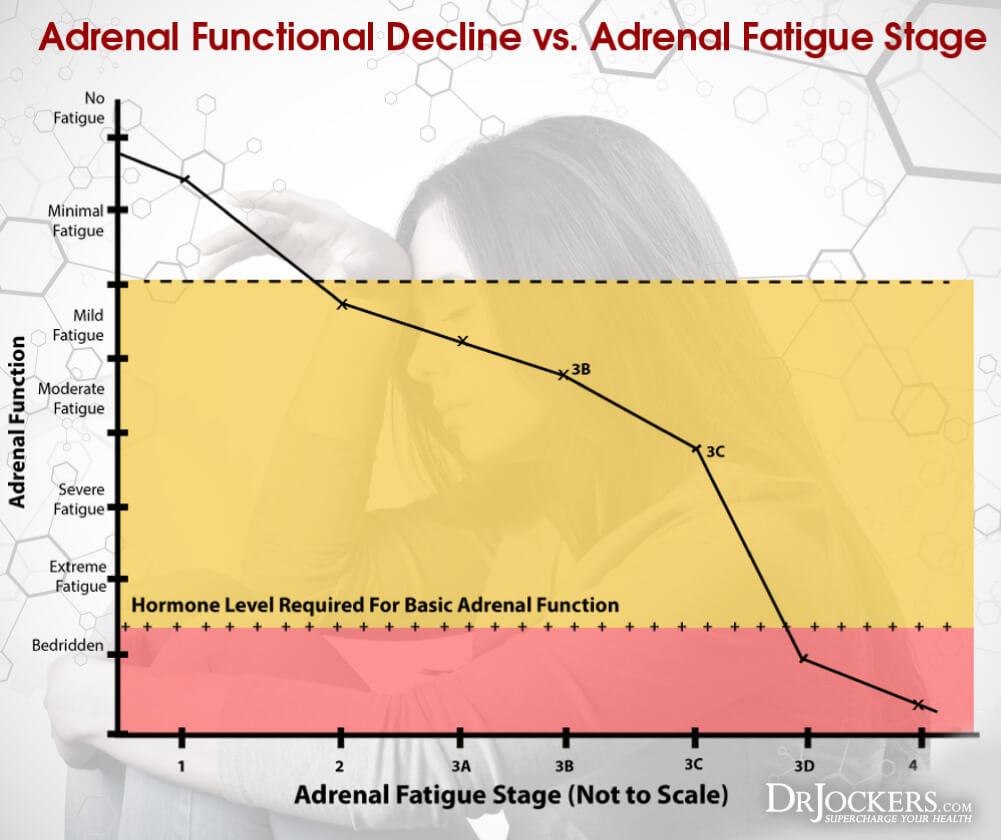
Phase 1: Initial Alarm Reaction:
This has elevated cortisol and DHEA. This is the normal acute response to stress and is often seen in hardworking individuals and athletes who are overtraining.
Phase 2: Deep Alarm Reaction:
At this point, the cortisol remains high, but the DHEA drops down to normal. This indicates a progressive state of the alarm reaction, and the body is no longer under acute stress. The reason that DHEA drops is that it is being used to make cortisol. This is where we begin to notice symptoms.
Phase 3A: Resistance Stage:
This stage is marked by high cortisol and low DHEA as pregnenolone steal is in place. Low DHEA sets the stage for major hormonal imbalances in the body. This stage is typically marked by insulin resistance.
Phase 3B: Deep Resistance Stage:
In this stage, cortisol is low, and DHEA is low. This indicates the progression of resistance into the exhaustion stage. Now the adrenals are so overworked that they are losing the ability to have any control over stress.
Phase 3C: Non-Adapted Adrenal Exhaustion:
At this stage, cortisol is low and DHEA is normal. This is where pregnenolone steal has failed to shift all the resources into cortisol production. There is still some level of DHEA, but cortisol levels are failing. This phenomenon could be due to insulin resistance, which should be evaluated.
Phase 3D: Inappropriate DHEA:
This is where Cortisol is low but DHEA is high. The individual may be supplementing with DHEA or they may have Polycystic ovary syndrome (PCOS). Insulin resistance may also be in play here.
Phase 4: Adrenal Fatigue in Full Exhaustion:
Cortisol and DHEA are both very low. In this state, the adrenals have completely lost the ability to control cortisol and adapt to stress. Frequent blood sugar imbalances and crashes are common in this state.
Summary on Adrenal Fatigue:
The adrenals play a vital role in our health, and understanding their function and how to analyze their stability is an important factor for a clinician to best help their clients. If you are suffering from any phase of adrenal fatigue or are looking to prevent this from occurring, begin following the 25 strategies that you can find in this article.
If you want to work with a functional health coach, I recommend this article with tips on how to find a great coach. On DrJockers.com, we offer long-distance functional health coaching programs. For further support with your health goals, just reach out and our fantastic coaches are here to support your journey.

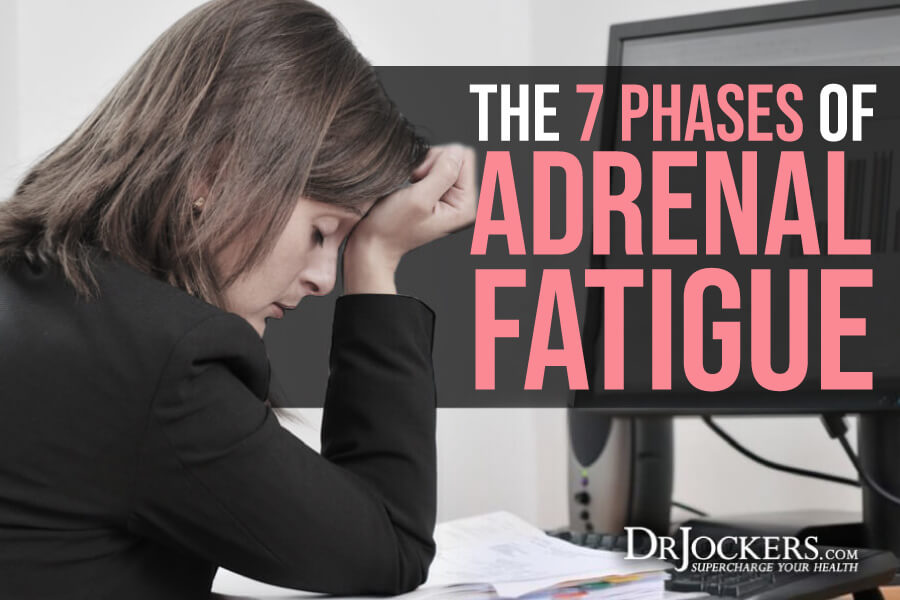
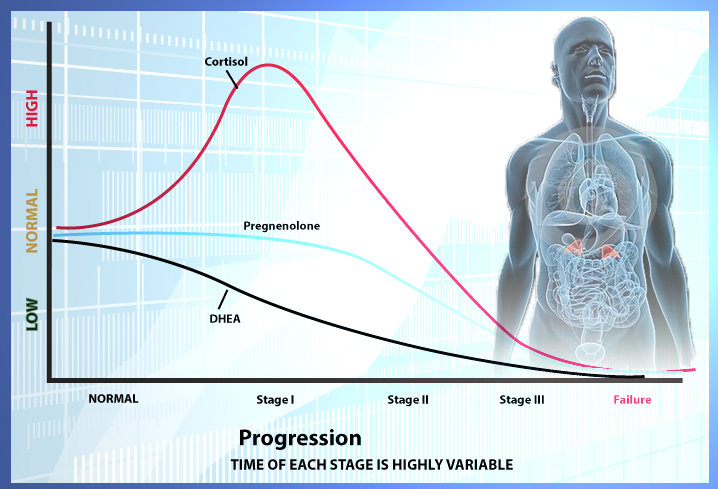




There seems to be a block when I try to read your.replies/comments. This says to me that dr jocker doesn’t want my opnion shared? Anyway you can always reply to me by messenger? I hope you are all well. Read about nervous exhausion this condition has been around for years and years. Same symptoms and good advice on how to recover. Without spending loads of money on supplements. My condition is real the testing was relentless but thank god they diagnosed me as I was on the floor close to an adrenal crisis which would of killed me unless I was injected with steroids. Have a cortisol blood test if its normal then ypur adrenals are working if it isn’t you will need steroids to replace what you are depleted in this is FACT. Mine do not produce cortisol as my pituitary gland is diseased. I have to take hydrocortisone 3 times a day if I dont I could be dead within the week. Cortisol is the most important hormone you have. Im not trying to scare anyone. Read about this. The Pituitary Foundation website is very good. Im a fully trained counsellor and psychotherapist in private practice and even though I am medicated I still feel pretty rubbish most days but push through it. I wear a medical alert bracelet and carry an emergency box of needles and vials of liquid hydrocortisone with cards and leaflets of information for someone to inject me if I am not responsive. This would save my life. PLEASE if you’re feeling all the symptoms of adrenal insufficiemcy (google this) then go and see your doctor. I wish you all well. Lisa
Yes that is an extreme case Lisa, I am glad you found support!
Lisa
Aren’t you having major side effects on the steroid? I had to get off the cortisone…. It will give you diabetes, heart disease etc. will shorten your life. Find a Dr that will treat you. Your own body can make cortisol again… it takes time. Lower your dose of cortisone. Your trading one condition for many more….I was there.
Hello!
My ND recommended i read the 7 phases of Adrenal Fatigue and told me i’m in phase 3A.
My life is a veritable hell since the flu in 2017.
Due to PTSD and severe childhood trauma, i have H.P.A. axis dysfunction…and the worst part of it is i am 73, afflicted with depression and anxiety. Chose to treat the depression and hope my hormone axis will regulate itself.
Is there hope for recovery?
Thanks!
Yes there is hope and this article will help: https://drjockers.com/heal-adrenal-fatigue/
Read about Pregnenonlone.
Hello, Dr. Jockers!
I’d like to know if 3A restistance phase progresses to 3B, C, and D. I live in fear of this happening to me, because my father became disabled from burnout and no one knew back in 1971 what was wrong with him…he basically stopped functioning and died from pneumonia at 70.
Obviously an epigenetic issue. Can I prevent this happening to me, or is my fate sealed?
Thank you for your valued opinion!
Yes absolutely it can. This is why you should be sure to follow the action steps in this article to get your stress response system under control. https://drjockers.com/heal-adrenal-fatigue/
I was born anxious…and there is a strong genetic connection: both parents depressed and anxious. Meditation doesnt work for people like me, so I finally decided to take an SSRI to help dampen down my stress response, thus allowing cortisol to return to normal, and helping my brain regnerate.
This should work!
Praying you get the results! Blessings!
What is SSRI?
Great question Beatrice- “Selective Serotonin Reputake Inhibitors”
Hi doctor!
I’m a 29yo male from Brazil.
I’ve been intoxicated with Ciprofloxacin in the ending of 2016.
Since then, I’ve been dealing with a lot of symptoms, some which haven’t got better till this day. My main issues now are fatigue and inability to gain weight, with weight loss as well.
I’ve started/stopped some natural adrenal fatigue treatments some times and always lived thru the stress that this intoxication took since it happened.
I’m at a point where doctors tell me I’m on the late stage of adrenal fatigue: My cortisol levels are low, my DHEA is high, my Estradiol is high and my Protesgerone is low.
I’m getting pretty anxious lately as I’ve been recommended by a physician to take Hydrocortisone, but steroids are not well tolerated by who had issues with Fluoroquinolones.
Do you think a natural treatment could help me balancing my hormonal levels and recovering my adrenals?
I am sorry to hear you are struggling with these issues Rick. It sounds like there is a lot going on. I absolutely recommend working with a functional health practitioner that will help customize a plan for you. This article can help: https://drjockers.com/functional-nutrition-tips-to-find-a-great-health-coach/
So here is my point made again. You can hear Mr Jocker has asked you to ‘work with a functional practitioner’. I.e maybe a Registered Doctor. And that all he can do is advise ‘reading ‘ one of his articles. Best advice. Mr Jocker can not help you get better if your adrenals are NOT functioning properly.
The qualified medical professionals can.
I really feel for you I know exactly how you feel – AWFUL, very ill, tired, fatigued beyond belief, no energy to even make a cup of tea, loss libido, probably feeling cold, lost weight, mental fog, depressed, crying, bad memory, no appetite- the list is endless. But you have had the proper test which has come back as your adrenals are NOT functioning you are suffering and I mean suffering either primary adrenal insufficiency or secondary adrenal insufficiency. If you cannot go on hydrocortisone how about prednisone, methylprednisolone? PLEASE go back to your doctor to discuss your options as if your cortisol levels are dangerously low you have a very high risk of an adrenal crisis this is life threatening. I have been medicated for nearly 8 years now it took months to diagnose me with pituitary disease and 2nd adrenal insufficiency. My endocrinologist has categorically told me that if I didn’t take my hydrocortisone 3 times a day I would be in serious body function trouble within days and dead within the week. This is how low my cortisol levels are. PLEASE PLEASE everyone who thinks they have adrenal “fatigue” go to your doctors FIRST get a simple blood test taken to see what your cortisol levels are reading if they are too low you will need MEDICAL intervention not a fancy diet or supplements these will NOT cure your illness.
They may help people who are burnt out due to too much stress but this is good old fashion ‘nervous exhaustion/breakdown’ not the new buzz catch phrase ‘adrenal fatigue!’
Nervous/mental exhaustion has been going around years and years google symptoms of nervous/mental exhaustion read the symptoms. If you change your lifestyle, eat healthier and learn ways to relax, plenty rest and sleep will get you back on your feet. I wish you all the best.
Hi Lisa, you are correct. I cannot establish a confidential physician-patient relationship over the internet. Every individual’s symptoms and needs are unique and should be treated so as well. Without the understanding of a person’s medical history, it is my recommendation to anyone to work with a well trained functional health practitioner. Blessings!
You cannot continue to take cortisone or prednisone long term! I was just there! Check out Coimbra Protocol…
I weened down and am now steroid free. I also learned
endocrinologist first defense is to put a person on steroids!
It was a long journey and I learned a lot!
One thing no one ever mentions: adrenal fatigue feels like you’re dying from a dread disease. There are times I felt like I needed hospital care..still do occasionally. What happens is those episodes lead to more stress and worse feeling…and still worse, until you feel you can’t function. We need to hear more about this horribleness of feeling, and less about the body systems.
Thank you!
Hey Robyn, I am so sorry to hear that you have had to endure this struggle. We try to offer a variety of articles for a topic to meet the needs of all of our readers. It is absolutely never my intention to dismiss the feelings that you experience.
Dr. Jockers,
Can you tell me what a 4 point saliva test can show for adrenals?
Thank you
Yes it can show your cortisol slope but I actually prefer the DUTCH test here: https://drjockers.com/the-dutch-complete-hormone-panel/